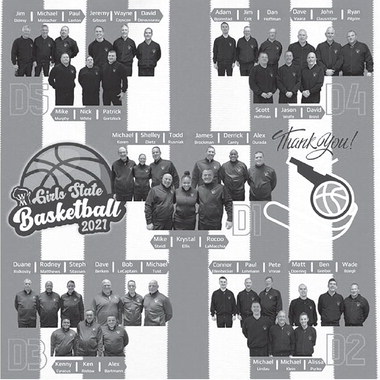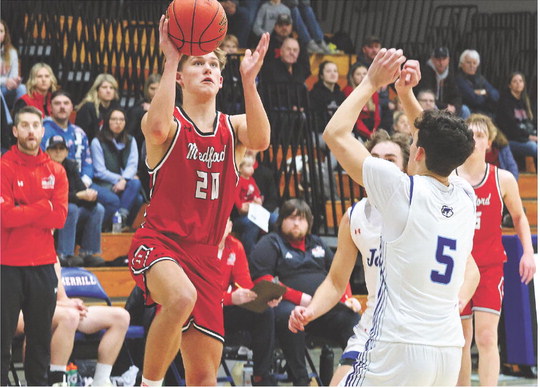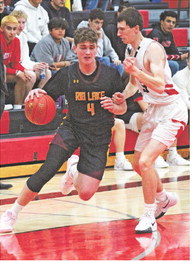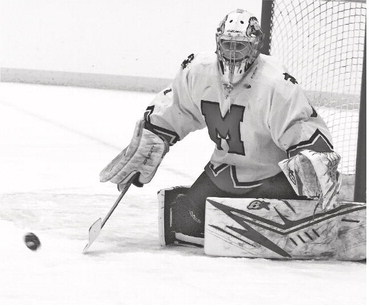“I thought it went well,” ….


“I thought it went well,” Lindau said. “I went and watched it again to see the ones that I called that I knew I got right and the ones that were kinda tweeners or the ones where maybe I shouldn’t have pulled the trigger on that. Fortunately there weren’t many of those. It was crazy. In the second half I didn’t hardly call any fouls or out of bounds or held balls. The ball kept going in the basket and there was a lot of action that ended up opposite of me.
“They were two very good teams,” he added. “Obviously you could just tell that, just like all the other teams that got into the championships, they just got tired. Reedsburg not having the longer delay and being younger, you could just tell in that second half they were just gassed.”
The Division 4 game for the three-man crew wasn’t as close as Mineral Point set a Division 4 state tourney record with 13 3-pointers and blew out Bangor 66-30.
“It was a three-seed versus a two-seed, so you expect a good game,” Clausnitzer said. “It’s always kind of fun as officials. (During warm-ups) you have your referee that’s in the middle and you have the two umpires, each one is watching each team. When you’re the referee you can watch both teams and kind of form a judgment from that. In our game, Mineral Point just looked bigger and stronger and that turned out to be the case. I didn’t expect it to turn into a 36-point game.”
The officials said butterflies are still present before any state game, but there are fewer with each appearance.
“You have to try to have fun with it,” Vaara said. “When you get nervous, I think you have to believe in your abilities because if you don’t, all of a sudden you’re going to be second-guessing yourself out there. There is no time for error. There really isn’t. I’m here for a reason. I have to focus and do my job. I have to believe that I belong, like any athlete in any other game.”
“You know the quality of teams are so much better that a lot of it gets taken care of by itself,” Lindau said. “You get to that sectional final, sectional semis, you don’t have the craziness sometimes.”
“Seasonal games are so much harder to ref than the state games,” Vaara said. “It’s a relief when you get to sectionals and regional finals. Finally you get two evenly-matched teams. They play defense. They’re not so handsy.”
“Definitely you get more relaxed, but it’s still state,” Pilgrim said. “You’re still excited. You still know that you have way more people watching both there and on TV. But you’re definitely more nervous the first time. I remember my first time and we joked about it last week. The picture (of our crew) came out on Facebook and somebody asked, why aren’t you smiling?’ I was like I was trying. I was so nervous. I couldn’t. That was all I could muster.”
While the crowds were much smaller than usual, the officials said there was energy in the building.
“There was noise,” Clausnitzer said. “That was more noise than we’ve had in a lot of games in the regular season.”
“It was still, to me, the state feeling, the state atmosphere,” Pilgrim said. “Was it emptier? Yeah. We could hear the dad in the upper balcony yelling, which you normally don’t. But you still had more people around the court. You still see more people at the table. You still had media on the other side.”
Officials chat
During a nearly hour-long interview, the four officials touched on a variety of topics relating to their craft.
_ The stories and headlines being reported about a shortage of officials in all WIAA sports are true, especially in this area of the state. Officials are needed and if there are people out there interested, there are people willing to mentor them and help them get started.
“There are so many guys reffing that can hardly move,” Vaara said. “Some of us have had to ref with some of them and it’s really tough to ref those games because you’re covering for them. They’re getting games because we’re getting no young people.”
All of the local officials are members of the North Central Officials Association (NCOA). One of the group’s main goals is to recruit new and, preferably young, officials. One of their notable efforts was a clinic with high school kids from Medford a year or so ago.
“We all belong to it and we’re willing to help,” Clausnitzer said. ‘I think our first goal was to mentor younger officials to keep it going. We’re just trying to get people to join and continue doing this sport that we all love.
“We’ve all been mentored by somebody along the line,” Clausnitzer added. “I got started way, way back out of college in an effort to make some money, but I take it upon myself to try to be a good mentor myself because of the way I was brought up. I had really good guys that were really helpful and asked what can we do to help you. We try to do the same thing. It’s certainly a reason I’m still going because I feel like I can give in other areas than just officiating too.”
The WIAA also offers information on becoming an official on its website, www. wiaawi.org.
_ The shortage is felt in how often officials get calls and emails from athletic directors and conferences looking to fill gaps. That was especially true during this pandemic season when schedules were constantly changing.
“I bet you there were at least 10 games canceled off my schedule,” Clausnitzer said. “Then somebody else would reschedule on that same night, so you’d get a game back. But man, the amount of schedules and everything it took. All the ink I used crossing off games and then changing it to I’m going here now. We had to make a lot of adjustments in a quick amount of time.”
“I wouldn’t have wanted to be an athletic director, that’s for sure,” Lindau said.
“Yeah, there were a lot of cancellations, but it was nothing like it could have been,” Pilgrim said. “The way it turned out and to be able to play state tournament games at all was nothing short of a miracle in some aspects.”
From an official’s standpoint, the early part of the season meant figuring out what masks or whistles worked best and getting a feel for how much mask enforcement was expected from them. Those things worked themselves out as the season went on and the WIAA helped out at tournament time with standard rules for mask warnings and penalties.
“I was just glad to be on the court because you heard of other states that didn’t have any seasons or are just starting,” Lindau said.
_ There is a lot of time and effort that goes into becoming a state-caliber official. For these guys, that includes critiquing each other, self-critiques through watching film and reviewing rules and being tested on them. Clausnitzer said it is stating the obvious, but “a thick skin” certainly is necessary to do the job.
“I love looking at film even though it’s really hard,” Lindau said.
“It doesn’t lie,” Clausnitzer said.
“You want to see it, even though you really don’t,” Lindau added. “Then sometimes it actually isn’t as bad as you thought it was in your mind.”
“There is a psychological side of it,” Vaara said. “When you’re reffing, you might hear a lot of people trying to influence your call. You have to make sure you stay focused and locked in. You can’t say, ‘now I have to make one up over here if I called two fouls there’ or if they’re yelling it’s 10-2 on fouls. You have to just stay in your moment and say, ‘I have to focus here.’ Don’t let your mind wander. Don’t worry about being hated right now. There is that mental side of it. You have to really concentrate.”
“In addition to some of the block/ charge calls, for me the most difficult thing is when a coach is trying to talk to you as the game is going on,” Clausnitzer said. “You’re trying to be able to listen to him and answer, but at the same time I’ve got a job to do out here and it makes it real difficult. I know Dave’s used the line, ‘coach quit yelling at me’ or ‘coach quit talking to me I’m trying to officiate the game.’” “(Basketball) is the hardest sport by far, especially when you got a call right and you know you have the rule reference,” Lindau said. “You want to give your explanation to the coach. You don’t want to stick it to him. You just want to be honest. In the flow of the game, you might not have that until the next timeout, then a lot of times, you’re like, ‘I don’t want to bring that back up.’” Pilgrim said relationships with coaches tend to get better the more games one officiates.
“After seeing you a couple of years, they know,” he said. “They know what they’re getting that night. So the questions from the coaches that have been around and know you are shorter. They know how you’re going to handle it, whether they agree with it or not. As you work with these coaches, it’s like anything else, you develop that relationship.”
_ Do officials work for the money? Of course. But who wouldn’t? All four said that was partially why they got started in high school or college. The supplemental income isn’t something the WIAA is shy about promoting either in its efforts to recruit new officials. Clausnitzer said regular-season pay in this area of the state is higher than average because offi cials are in such high demand.
“Officiating is like a second job,” Vaara said. “Some guys would say if you’re doing it for the money, you shouldn’t ref. Well I kinda do it for the money too. I do have a sense of pride. I’ll make anywhere between $3,000 and $4,000 a year. It’s how you buy your toys or supplement this or that.”
“You’re giving up your time away from your family, right?” Pilgrim said. “We’re leaving the house at 5 p.m, getting home around 10, so you’re gone five hours. You should get compensated somewhat. Yeah, we do it for the kids and that’s the ultimate goal, but on the flip side you wouldn’t expect anyone else to leave their house and get yelled at for an hour and a half and just get a ‘thanks for coming.’” But they insist, there is much more to it than that.
“It all goes back to why we officiate,” Pilgrim said. “For me, obviously I love basketball, I love being part of the games. But just being able to have these games for these kids and have it ran correctly and give them the best experience that they can get. It bothers me when I see a game and you can tell these people are just out there because I get $20 or whatever. That’s not what we’re supposed to be about. To get more people, to provide that experience for not only the players but also for other people is what we’re all about.”
“For me, it fuels that competitive drive,” Lindau said. “I’m not going to pick up a basketball anytime soon and risk getting hurt and things like that. But I’m competitive with myself and as a team, we want to be the best officials or crew. Every baseball game I step out there, I want to get it 100% correct. If I make a mistake in the first inning, well we’ll try again next time. That’s the competitiveness that just feeds that that nothing else will. That’s why I love doing it.”






